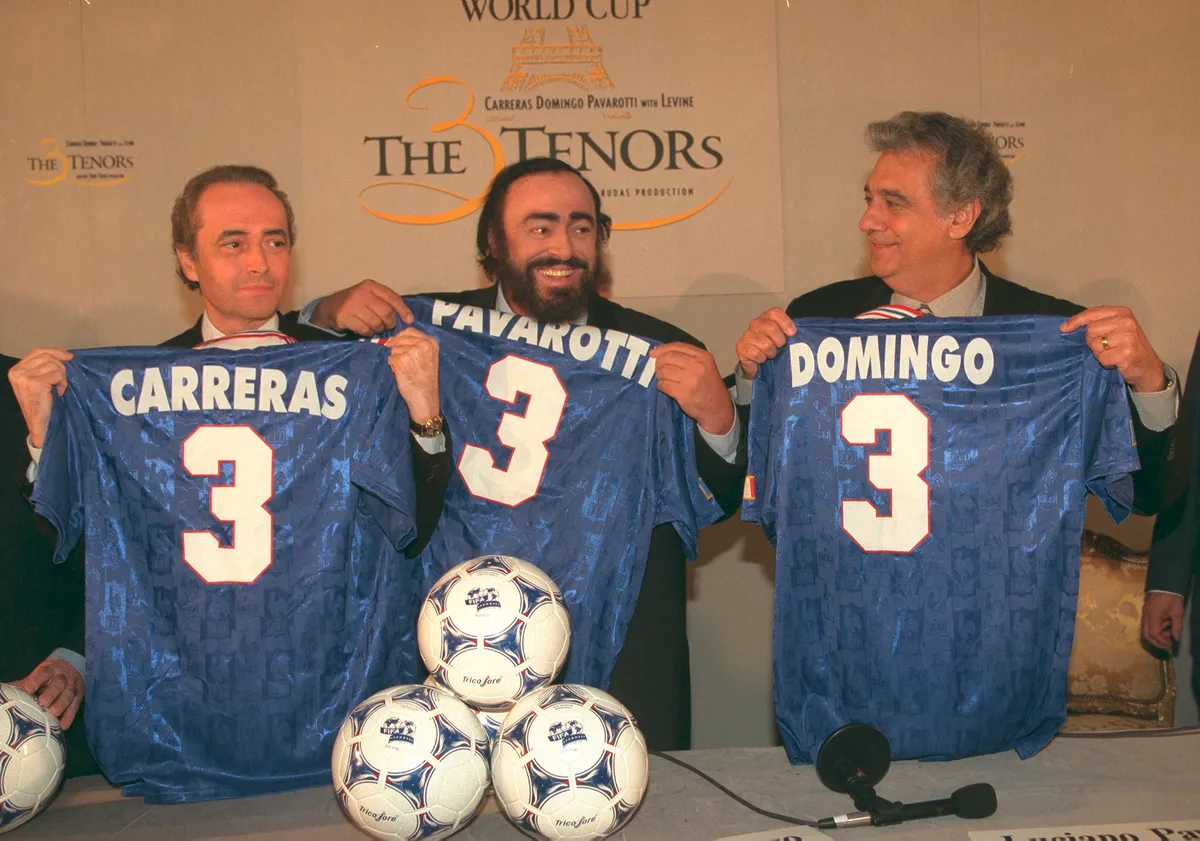The soundtrack of everyone’s life in summer 1990 was Luciano Pavarotti singing Puccini’s ‘Nessun’ dorma’.
And, probably, the Three Tenors concert on 7 July, the eve of the World Cup final of Italia 90: a light-hearted showcase of him, Plácido Domingo and José Carreras beautifully performing the great and the good of the tenor repertoire, individually and together.
Who were The Three Tenors?
The ménage à trois proved a huge, unexpected success. It spawned the biggest-selling classical album ever, and multi-million pound tours. It shook up classical marketing. Crossover albums, Vanessa-Mae, Sarah Brightman, Russell Watson, ‘stadium tenors’, ‘popera’... it’s The Three Tenors you should thank. Or blame.
But despite subsequent accusations of selling-out, tax fraud, and inappropriate gum-chewing, The Three Tenors phenomenon remains how it felt that starry night at Rome’s Baths of Caracalla: a glorious celebration of high art and popular song, astounding vocal technique, and a dash of amiable larking about.
And of football, of course, opera’s sporting, rough-diamond cousin. They’re clearly related.
Both are about emotion, triumph and tragedy, and both involve hugely paid, temperamental international talents unconvincingly pretending to mortal wounds on a high-profile stage. There are plenty of tears in both, too – few can have forgotten how England’s Paul Gascoigne cried as his team got knocked out of that 1990 tournament…
How did The Three Tenors form?
Back then, though, the classical/football link seemed tenuous. Opera was high-culture, football was low-status, with the Heysel and Hillsborough stadium disasters still raw in the memory. But the BBC’s use of Pavarotti’s rendition of ‘Nessun’ dorma’ as the Italia 90 theme helped elevate the sport.
In 1989, BBC producer Philip Bernie applied Puccini’s majestic aria to a clips compilation from previous world cups. He loved the defiant climax of that penultimate high B, the ‘-ce-’ of ‘vincerò’ (‘I’ll win through’) – Pavarotti, like everyone, milks the final two notes far longer than is indicated in the score; how could anyone resist?
- Luciano Pavarotti: The best recordings
- What are the lyrics to 'Nessun Dorma' from Puccini's opera Turandot?
According to Bernie’s blog, ‘This seemed to me to fit perfectly, both in terms of the word and the intensity, with an especially memorable image from Italian football: when Marco Tardelli scored the crucial goal in the 1982 World Cup final for Italy against Germany, he ran away, arms spread and mouth wide open in utter exultation.’ The decision to keep using it for Italia 90 was evidently Brian Barwick’s, then head of sport – presenter Des Lynam had apparently wanted the then-better-known ‘O sole mio’.
The single reached No. 2 in the pop charts; England finished No. 4 in Italia 90, losing to the hosts the night of the concert. For a while it felt classical music was going mainstream, though it’s never reached those heights since. Nor have the England football team.
Were The Three Tenors football fans?
Football links were appropriate. All three tenors were fans (Domingo, Real Madrid; Carreras, their arch-rivals Barcelona; Pavarotti – a good enough goalkeeper in his youth to consider being professional – Juventus).
Immediately before the 1990 concert, they were avidly watching that England-Italy match. Pavarotti said it was probably good that Italy had failed to make the following day’s final, as it would have distracted him from the music.
Genuine friends, and respectfully competitive, the Tenors were clearly distinct personalities. That was part of the charm that endeared them to everyone from jaundiced critics to your best-friend’s mum.
Domingo, born 1941, was the great all-rounder, the profoundest musician of the three. His voice, as richly coloured and characterful as a Rembrandt, has done everything from native Spanish pop to Wagner; increasingly familiar with baritone roles, he’s conducted too.
Pavarotti (1935-2007) was an all-rounder only physically: naturally dominant in onstage antics and in vocal presence, especially up the top, he smartly stuck throughout his career to home turf, Italian repertoire that suited his gleaming silvery voice.
‘The other guy’ (according to a running gag in the US comedy Seinfeld) was José Carreras – more accurately ‘Josep’, a proud Catalan. Born 1946, he was the youngest, smallest, least imposing of the three, with debate over how well his vocal cords had withstood chemotherapy; but his lyricism and sincerity was never doubted.

The Three Tenors concert, according to Carreras’s recent autobiography, was his idea. When he was diagnosed with leukaemia in 1988, Domingo and Pavarotti’s support was immediate. A year later, having beaten off the disease, he revived an idea floated ten years before to commemorate the tenor Giacomo Lauri-Volpi (1892–1979): getting together onstage. With Italia 90, and to celebrate his return to health, its time had come. Pavarotti and Domingo gladly agreed.
But it’s the promoter Mario Dradi – Carreras’s manager in Italy – who usually takes the credit. Certainly, he made that first concert happen.
He brought in Zubin Mehta as conductor (though the first Mehta knew about it was reading a newspaper, which he dismissed as gossip). He battled red tape and obstructive officials – ‘the biggest problems were the political problems, in the sense that everything is a political problem in Rome’, he said.
Dradi also received endless suggestions for adding glitz to the staging. An American MC? Scoreboards for each tenor? Individual platforms rising and falling during performance? Wisely, he ignored them all.
Deciding the programme of individual aria favourites had been an easy joint task. But Mehta insisted on a threesome too: ‘I said if you don’t sing together, you might as well sing in three different places’. There being ‘no trio that made sense’ in the literature, they commissioned one from Argentinian composer Lalo Schifrin, a 20-minute encore of the tenors’ favourite popular songs – artistically it was a tricky task, but then Schifrin had written the theme to Mission Impossible.
After the individual showpieces, the tenors could jokingly compete, in ‘Memory’ from Cats, ‘Ochi tchorniye’, ‘Tonight’ from West Side Story, ‘O sole mio’, ‘Nessun’ dorma’...
The concert itself delighted the 6,000 audience – it’s said 100,000 tried to buy tickets – plus millions of worldwide TV viewers. The concept of a massive, open-air, amplified, classical-crossover concert had proved a triumph.
Mehta afterwards, reflecting general opinion, stated ‘I don’t think this concert will ever happen again’. For once, his artistic judgement was wrong.
How many copies did The Three Tenors album sell?
Classical releases typically sell in the hundreds; a thousand or two if you’re lucky. Decca’s recording of The Three Tenors concert sold over ten million, surprising everyone – especially Mehta and the tenors, who had signed away their royalties for a flat fee. (Pavarotti’s former manager Herbert Breslin, in a caustic memoir unflattering to everyone, claimed it was $300,000 each; Mehta however says there were ‘completely over-the-top rumours, mostly about the fees’, and that ‘we didn’t make a penny from it’.)
But suddenly, The Three Tenors concept was a licence to print money – even more than Pavarotti’s late-night poker sessions which, Carreras recalls, used photocopied dollar bills for stakes. When the 1994 World Cup came round, in the US, another eve-of-final concert was inevitable. And the artists made sure they were well paid: $1.5m apiece, it was rumoured.
Tibor Rudas, Pavarotti’s manager, produced it this time. This Los Angeles concert was even bigger and more populist than Rome’s. It included ‘My Way’ and ‘Singin’ in the Rain’, to the bemusement of audience members such as Frank Sinatra and Gene Kelly.
Pavarotti, chewing gum throughout, was criticised by some for not taking it seriously. But it proved even more lucrative; indeed, in the American-speaking world, it’s ‘the’ Three Tenors concert.
And so it went on. A Christmas special, featuring ‘Jingle Bells’; world tours; more World Cup concerts. Carreras says it seemed you couldn’t have an international football tournament without their presence.
Were they getting too popular? Pavarotti riposted there was no such thing: ‘music should be like sport, for everyone’. They were out-earning even footballers. Laughed Pavarotti, ‘Good money? By God, it’s good money!’.
Popularity led to parody, on primetime TV and beyond. In a 1998 German children’s book, Am Südpol, The Three Tenors visit the South Pole to perform for penguins, because everyone else has had enough. The penguins, however, are more interested in the Spice Girls and ticket scalping.
What happened to The Three Tenors?
The pop/classical envelope wasn’t the only one being pushed. Also, allegedly, were plain ones, into back pockets, stuffed with cash. The 1990 concert had been, in principle at least, for charity; Dradi insisted it had raised half a million pounds for good causes.
But now, German producer Matthias Hoffmann was in financial control. He believed charity begins at home: having hidden £6m from the taxman, he was convicted of fraud in a German court in 1998 and got five years in prison.
When was the last Three Tenors concert?
The last Three Tenors concert was in 2003. During the final years, Carreras – says his autobiography – was social middleman between Domingo (increasingly busy with heavyweight musical ventures and new roles – including, winningly, himself, in The Simpsons) and Pavarotti (who was easing up, partly because of bad health, partly to enjoy celebrity hanging-out). The Italian died of pancreatic cancer in 2007, his voice much missed, his flaws acknowledged, his well-maintained wine-women-song-and-food persona hard to dislike.
How did The Three Tenors change classical music?
By showing there was a vast, hitherto untapped, audience for slickly produced, audience-friendly ‘classical lite’, the success of The Three Tenors changed the face of classical music marketing.
Marius Carboni, then a press officer with EMI and now a university lecturer in marketing, did his PhD thesis on how classical labels adapted the methods of pop marketing in their wake. EMI, he says, had started the snowball rolling in 1989 with its then-innovative (for classical) campaign for violinist Nigel Kennedy’s Vivaldi Four Seasons: they targeted radio stations, non-classical magazines such as Q, and London Underground posters.
After The Three Tenors, Carboni says, record labels reorganised themselves into ‘strategic classical’ (big-budget popular campaigns) and ‘core classical’ (‘normal’ releases, subsidised by the strategic classical albums). He gives the more recent example of Tasmin Little’s 2008 album The Naked Violin, marketed online as pay-what-you-like, following on the example of Radiohead’s 2007 album In Rainbows.
Every crossover TV-tie-in album, every talent-show ‘opera singer’ who’s never actually been in an opera, every bright young genuine classical talent whose hairstyle is as important as their technique... it all stems from The Three Tenors. They effectively ‘went viral’ before the internet had even arrived; now, classical blockbusters – often niche releases too – depend as much as pop on websites, downloads and social media.
But what about The Three Tenors themselves? How do people remember that initial concert in Rome? A quick canvas of opinion on social media provides a wealth of feelgood memories.
Virtually every comment finishes with a smiley face, as did each of the singers after the 1990 concert – their performance certainly beat the shabby Germany-Argentina final that followed, an ugly fight during which a game of football occasionally broke out.
And, despite the subsequent bluster, hype, dodgy dealings, and sometimes questionable artistic choices, The Three Tenors still make us, too, smile – at their voices, their personalities, their fearless populism. Plácido, Josep, Luciano, we salute you for that unforgettable summer. You played a blinder.
Pics: Getty

